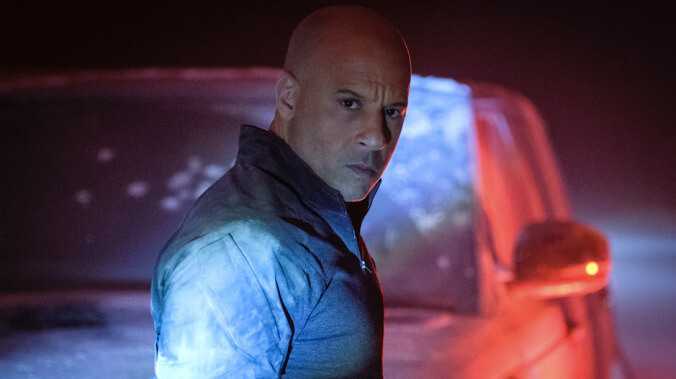Does every A-list action idol eventually reach the point in their career where their vehicles start to look like career commentaries? Think of Arnold, reflecting on his own obsolescence as a perfect physical specimen. Or Will Smith, sparring with the digital phantom of his past self. In Bloodshot, a preposterous new superhero time-waster that’s like something Philip K. Dick might have dreamt up after a concussion, Diesel screeches into his own noisy star text. He plays Ray Garrison, a soldier murdered and then reborn as a Frankenstein monster of military hardware. In place of blood, his veins now course with “nanites,” a.k.a. microscopic machines that lend him superhuman strength, 5G healing speed, and a nifty magma-red glow behind his eyes and ribcage. He’s a blunt instrument of modern warfare: a prototypical tough guy made tougher through technology. Which, really, is one way you could describe Diesel, whose Cro-Magnon “charisma”—the granite features, the caveman crudity of his delivery, that low mutter that sounds like an idling engine—is increasingly augmented with expensive digital effects. The movie’s mad scientists even find a way to weaponize Ray’s loyalty, the philosophical fuel that drives Diesel’s most famous alter ego; this fast and furious badass may never say the word “family,” but it’s still his prime motivator, exploited by his new handlers.
Ray’s been pulled from the pages of a comic book that launched in the early ’90s, an era of “extreme” antiheroes armed with lots of big guns but little in the way of identifiable character traits. This version of Bloodshot (the code name is never uttered on screen) has a slightly different backstory—before the fateful operation, he’s a globe-hopping grunt, not a cold-blooded mob hitman. But he fits the same profile: laconic, humorless, boringly unstoppable. Sony, the studio that bankrolled this gimcrack adaptation, is angling for one of those profitable, fashionable shared universes, hoping that Bloodshot can anchor a whole interconnected franchise based on the Valiant Comics roster. Good luck with that. Marvel, after all, had the good sense (or blind luck) to launch its decade-long crossover event with a fountain of irreverent wit and deadpan charm. Bloodshot is no Iron Man. He hasn’t a personality to speak of. Which does, to be fair, make him a good fit for Diesel, that slab of monosyllabic machismo.
Ambushed during a softly lit love-nest Italian getaway, Ray can only watch as a casually sadistic terrorist supervillain sashays in to the tune of “Psycho Killer,” then uses an Anton Chigurh gas-powered bolt stunner to execute his wife (Talulah Riley), before putting a bullet in the good guy’s noggin. When he awakens, our hero’s in a skyscraper techno-futuristic HQ that’s like a laboratory crossed with a Planet Fitness; his mind a foggy haze, Ray reluctantly joins a team of similarly upgraded combat veterans—“Welcome to the circus” goes one shop-worn icebreaker. These first 40 minutes are so generic that they could have been written by algorithm. That, as it turns out, is as much feature as bug. Bloodshot has a clever twist up its sleeve—a plot turn that actually accounts for its paint-by-number storytelling and lazily trotted out genre-movie tropes. One clue is that the dubiously good-intentioned mastermind of Ray’s resurrection is played by Guy Pearce, living callback to the brilliant amnesia games of Memento. Another is the byline: The screenplay has been co-written by Eric Heisserer, who previously played ingenious tricks of memory and unreliable perspective in the Oscar-nominated Ted Chiang adaptation Arrival.
Still, don’t mistake the pedigree for a preemptive Hugo Award. Bloodshot is about as convincingly cerebral as, well, putting a lab coat and glasses on Vin Diesel; it’s soft-brained comic-book silliness draped in hard sci-fi spandex. Even as the film pulls back one layer of clichés, it reveals another—imagine coming out of a simulation to find yourself in another simulation. (Points, at least, to New Girl’s Lamorne Morris, having a good time with the stock role of the socially awkward, motor-mouthed coding wiz.) The real issue, though, isn’t that Bloodshot would fail an IQ test. It’s that its dumb fun isn’t executed with panache, smart or otherwise. Director Dave Wilson, making his debut behind the camera after supervising the cut-scene effects of various AAA video games, largely botches the set pieces—cutting shootouts into ribbons, staging showdowns in foggy tunnels. At times, he bites on the surveillance-state parallel action of a Bourne entry or a Tony Scott blockbuster but makes a hash of the crosscutting. Perhaps not surprisingly, the film only lurches to life when leaning into the kind of elastic physics you might encounter on the Xbox or in a splash panel. The climax, involving fighters scaling and plummeting down the side of a glass tower, has a rubbery appeal. If nothing else, you can imagine Diesel grinning at the thought of one-upping a vaguely similar sequence in his arch-rival The Rock’s spinoff from the Fast & Furious hub, Hobbs & Shaw.
But if Bloodshot honestly expects us to invest in the tragedy of Ray’s predicament—his transformation into a mind-wiped army of one—Diesel isn’t up to the task. There was a time when he seemed to possess loftier acting aspirations; Steven Spielberg and Sidney Lumet saw flickers of raw talent beneath his rippling Rob Liefeld physicality. These days, though, the default setting is monolithic gruffness. Even in the fairly infrequent moments when he’s grunting out dialogue, Diesel brings to Bloodshot all the dimension and soul of a mute video-game avatar—though, again, maybe that’s what the part called for. Ray, like the star playing him, is more bullet than man; with his aerodynamic dome, he even looks like one. And in the film’s vision of forever wars and the rebooted soldiers fighting them again and again, it locates a metaphor for a career: endless variations on the same scenario, only the details changing like a green screen with the click of a mouse.










































